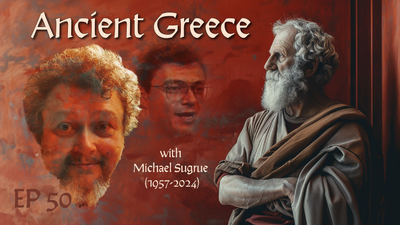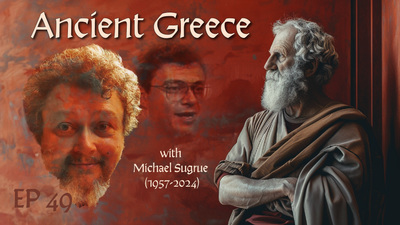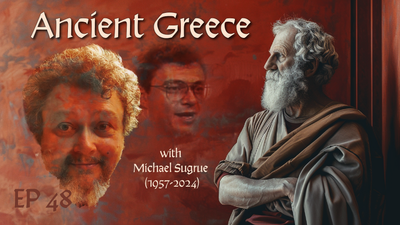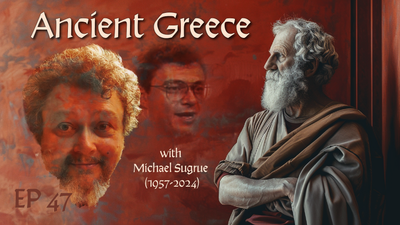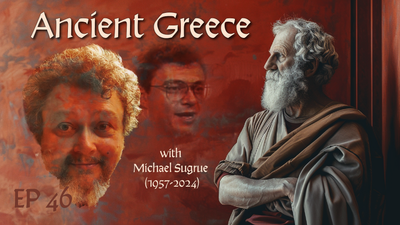In our 37th week of Plato Re-Imagined, we explore how myths enrich our understanding of human nature and moral duty. For Plato, myths serve as essential tools in his dialogues, capturing truths that logic alone might overlook. As he crafts allegories to engage his readers, Plato uses these narratives to provoke questions about society, virtue, and the self. This week, we’ll dive into the purpose behind Plato's myths, particularly their role in sparking the imagination and illustrating ideals worth striving for.
Plato’s myths are more than poetic devices—they hold ethical implications for his readers. By presenting stories that invoke wonder and reflection, such as the Myth of the Metals, Plato asks us to consider our place in the world. How do we balance our individuality with our responsibilities to the community? These questions remain as relevant today as they were in ancient Greece, where myths shaped not just personal beliefs but social ideals. This week, we’ll uncover these powerful connections and consider how they invite us to rethink the values guiding our lives.
From the Archives of Ancient Greece: Featuring Dr. Michael Sugrue
Dr. Michael Sugrue sheds light on Plato’s profound use of myth to communicate his philosophical visions. According to Sugrue, Plato employs myths to illustrate ideas that words alone might fail to convey. In The Republic, the Myth of the Metals imagines a society where citizens are metaphorically born with different types of “metals” in their souls, symbolizing their natural roles. Gold souls represent the guardians, silver the auxiliaries, and bronze or iron the producers. Through this hierarchy, Plato emphasizes the need for harmony and justice within a society where each person contributes according to their abilities and virtues.
Sugrue explains that Plato’s myths function as moral and social guides rather than mere stories. Unlike doctrines that dictate rigid principles, these myths provide ethical frameworks, inviting individuals to internalize values in a way that resonates personally. In today’s context, this could mean recognizing our strengths and using them in service to a greater good. Whether as a leader, supporter, or creator, each role has intrinsic value, reflecting Plato’s vision of a balanced society. As we reflect on Sugrue’s insights, we’re reminded that these ancient myths are more than relics—they’re blueprints for ethical living, urging us to pursue harmony and purpose in a complex world.
Insights from the Dialogues: Quoting Plato
In The Republic (414d-415d), Plato introduces the Myth of the Metals to communicate his vision of a just society. Here, Socrates describes how individuals possess different “metals” in their souls that predetermine their roles. Guardians are “golden” by nature, guiding the city with wisdom; auxiliaries are “silver,” ready to defend it; and producers are made of “bronze,” supporting the city through crafts and trade. Far from advocating rigid social determinism, Plato’s myth suggests that a just society values each role, promoting harmony through cooperation.
Consider a modern organization where employees play distinct roles: leaders strategize, support teams implement, and craftsmen or specialists create products or services. Just as each role within Plato’s myth has its intrinsic worth, each function in an organization today contributes to the overall mission. Plato’s myth challenges us to honor diverse contributions, ensuring that every role, whether front-facing or behind the scenes, aligns with the common good. In embracing this holistic view, we can build communities and workplaces that reflect both individual strengths and shared purpose, an ideal worth imagining.
Chance and Fate: Exploring Ancient Games
Ancient Greeks were fascinated by the concept of fate and often explored it through gaming. Games like astragali, which used sheep knucklebones as dice, were popular and symbolic of life’s unpredictability. Just as these games introduced elements of chance, Plato’s myths reveal how life, too, combines fate with free will. In the same way that a toss of knucklebones might change the course of a game, choices within our lives shape outcomes within the boundaries of our inherent nature or “metal.”
Explore the Mystical World of Astraguli: Ancient Games of Chance with Cultural Significance.
Plato’s myths intertwine with these ideas, suggesting that while we’re born with certain predispositions, we’re not bound solely by them. The Greeks’ use of games as metaphors for chance and fate offers a glimpse into their philosophy of life’s unpredictability. In today’s world, we may not roll knucklebones, but we encounter chance daily. Decisions, seemingly small or random, can lead us down unexpected paths. By understanding this blend of destiny and choice, we can live with greater awareness and purpose, embracing both our inherent qualities and the risks that shape our lives.
Virtues Revisited: Practical Lessons for Today
This week’s focus is Justice, a theme that runs through Plato’s myths and their lessons. Justice in Plato’s view is about more than enforcing laws; it’s about living harmoniously, each person contributing in a way that reflects their unique strengths. The Myth of the Metals presents a model where societal roles contribute to a well-ordered, fair community. When each person fulfills their role, the city thrives; when one role overpowers another, discord arises.
Today, justice remains a critical question—how do we balance individual aspirations with communal responsibility? Plato’s myth encourages us to look beyond personal gain, understanding that true justice emerges when every part of society is valued and everyone plays their role with integrity. This idea resonates in workplaces, communities, and even families, reminding us that collective well-being relies on mutual respect and collaboration. In considering justice as Plato envisioned, we’re reminded of the potential for a balanced society, one where justice truly serves as the cornerstone of human interaction.
Engage with Us: Reader’s Corner
We invite you to join the discussion on planksip.org, where the ideals in Plato’s work find new life through community engagement. How do Plato’s myths resonate with your personal experiences, or even with your professional challenges? Do you see modern parallels to the roles in the Myth of the Metals? Share your insights and reflections with us, and you may see them featured in next week’s newsletter. Together, let’s explore how ancient wisdom can illuminate our lives today.
Closing Reflection: Socrates’ Enduring Legacy
Plato’s myths go beyond storytelling; they are vessels of wisdom, urging us to examine life’s deeper questions. Socrates often used myth as a teaching tool, helping his listeners envision abstract truths through narrative. As we reflect on these stories, we find ourselves drawn not only to ancient ideas but also to timeless virtues that continue to inspire and challenge us. Whether through myth or dialogue, the wisdom of Socrates and Plato endures, guiding us toward a vision of the good life grounded in harmony, purpose, and justice.

Plato Re-Imagined
This course offers 32 comprehensive lectures exploring most of Plato's dialogues. These lectures guide students toward a consilient understanding of the divine—a concept that harmonizes knowledge across disciplines and resonates with secular and religious leaders. As a bonus, Lecture #33 focuses on consilience, demonstrating how different fields of knowledge can converge to form a unified understanding.


